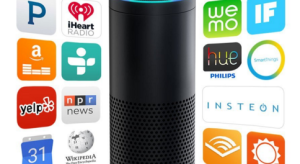I predict every elderly person will soon have a personal home assistant, ready to respond to their every command.
However, that home health aide may not be human, but sit on the kitchen counter, and look suspiciously like Amazon’s breakthough IoT device, The Echo.
The late Mark Weiser, “the father of the Internet of Things,” famously predicted that “the best computer is a quiet, invisible servant,” and that’s certainly the potential with Echo, or the just announced Google Assistant (how sexy is that name? I like the fact it’s so impersonal. Let’s you fire one voice “assistant” and hire another without becoming personally attached, LOL), or the much-rumored Apple version, which might also include a camera (disclaimer: while I work part-time at an Apple Store, I ain’t privy to any inside dope, no way, no how).
That’s particularly the case when it comes to seniors, and my SmartAging vision of an IoT-based future for them combining Quantified Self health monitoring devices that can motivate seniors to improve their fitness levels, and smart home devices that can make it easier to manage their homes as they age, to avoid costly and soul-deadening institutionalization (or, even better, combining the two, as with one of my favorite IFTTT “recipes,” programming your Jawbone to wake you gently at the best time in your sleep cycle, AND gradually turn on your Hue lights. How better for a senior — or anyone — to start their day on a positive note (OK, I know what you’re thinking: better turn on the coffee maker automatically!).
What really got me thinking about the advantages of a voice-activated future for seniors was a recent story about a similar app for the other end of the age spectrum, developed by our Children’s Hospital, for Alexa: KidsMD. What better for a harried mom or dad, with his or her hands full, AND a sick child to boot, than to simply ask for advice on temperature, fever and the like? That got me thinking that the same would apply to seniors as well, needing advice with some of the unwanted aspects of aging (I could mention here an example from a senior I care for, but that would be most unpleasant…). As I’ve said before, this would be helpful under any circumstances, but when the person needing help is a frail, tech-averse senior, it would be superb if s/he only had to speak a simple command or request to get needed help, or advice on something such as the proper amount of an over-the-counter drug to take.
There are tons of other life-improving reasons for such an approach for seniors, including:
- automating many aspects of shopping, as with the Amazon Dash buttons or their new software equivalents
- or, if they still get out-and-about, managing their daily to-do and/or shopping lists
- being able to instantly call up music from the 1940s that they’d never thought they’d hear again.
Of course, and I can’t emphasize this enough, especially since seniors are already victims of so many scamming tricks, because these counter-top devices are always on, listening to you, and because much of their possible use could be for reporting confidential health or financial data, privacy and security MUST be THE top priority in designing any kind of voice-activated app or device for seniors. Think of them as the canaries in the coal mine in this regard: protecting vulnerable seniors’ privacy and security should be the acid test of all voice-activated apps and devices for people of all ages.
Having said all that, as I noted in a piece last week about what a stunning combination of services Amazon has put together to become the dominant player in the retail IoT sector, one of those offerings is the $100 million Alexa fund to fuel advances in the voice-activated arena. I’m ready to put their money where my mouth is (LOL) in this regard, to design voice-activated devices and services for seniors. If you’d like to partner, E-mail me!!

